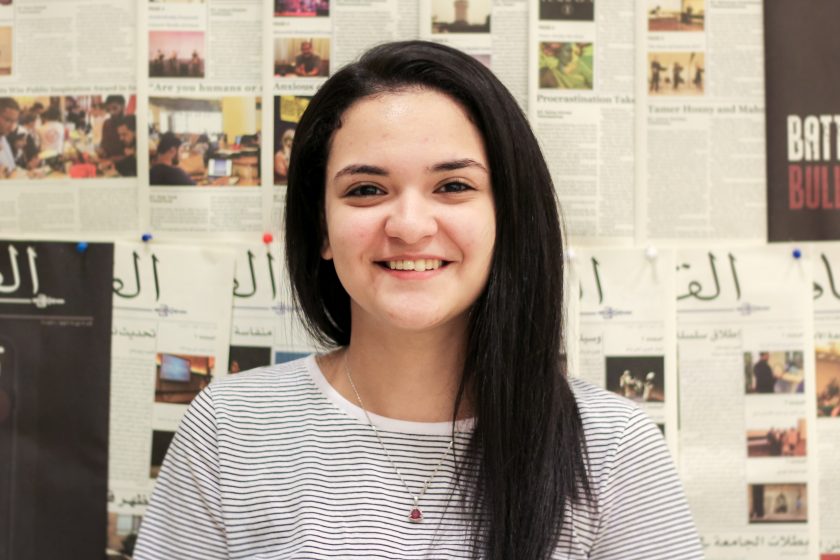By: Eman Kharoshah
Editor-in-Chief
In 2000, when I was just two, 12-year-old Mohamed El Dorra was shot and killed by the Israeli Occupation forces in the Gaza Strip. I am sure many of you remember his name, the one that introduced most of our generation to the Palestinian struggle.
Growing up, I occassionally saw on social media the very well-known photo of the father shielding his son under a hail of bullets, which then became the theme of the second Palestinian Intifada and an iconic image of what Palestinians endure under occupation.
Later, social media and television became the only means by which I learned about the Palestinian cause and actually bothered to read and watch videos to educate myself.
When I look at the younger generation now, the ones who haven’t witnessed the Israeli brutality in Palestine and are more often than not, uneducated on the Palestinain cause, I feel that it is our responsibility to start telling them stories, showing them pictures, reminding them that Palestine was not “just an empty land before Israel”.
Alas, the suffering of the El Dorra family has been repeated countless times in the past two decades, with the latest war on the Palestinian people just the newest chapter.
This time, the tragic chapter is about dispossession.
The Palestinian residents of the East Jerusalem district of Sheikh Jarrah issued a statement in March 2021 in response to an Israeli court ruling to forcibly evict 12 families from their neighborhood, and hand their properties to Israeli settlers.
The Sheikh Jarrah issue is not a new one. It has been quietly building up as more Palestinians are forced out of Jerusalem to make way for Israeli (and American, British, Australian Jews) to take their place.
The latest ruling left some families having until next month only to evacuate their homes.
“In total, 28 Palestinian families, or about 550 people, face the threat of displacement and deportation from Jerusalem during the next few months,” the statement read.
On May 11, the Arab League called the evictions “systematic Israeli aggression that aims to Judaize Jerusalem city and distort is Arab identity.”.
Hashtags (#FreePalestine, #SaveSheikhJarrah, #EndTheBlockade) and headlines have since dominated social media platforms and gained momentum overseas expressing solidarity. Since then, I’ve been reading and educating myself on the situation as soon as I learned that my voice matters.
Toward the end of the Holy Month of Ramadan and the advent of Eid Al-Fitr, Sheikh Jarrah was transformed into a war zone. Residents had been harassed and forced out of their homes by Israeli settlers and police.
Hundreds of Palestinians protesting against the crawl of systemic dispossession following the eviction of six Palestinian families from their historic homes have been attacked and injured by Israeli police and the military.
According to Reuters, the 11-day attacks in Gaza led to the death of 243 Palestinians, of which 66 were children, and wounded 1900.
Taking all of that into consideration, it is fascinating how the world is standing in solidarity against the Israeli wave of violence taking place in Palestine. Protesters of all backgrounds and creeds rallied to express their anger and condemnation of the violence in several cities – New York, Milan; Brussels; Berlin; Doha; Dhaka; Bristol; Amman; Cardiff; Dublin; Paris ;Sydney ; Chicago; Liverpool ; Los Angeles; Amsterdam; Edinburgh and Damascus, to name a few.
This all happened in tandem with similar protests on social media, where the Palestinisn plight was brought to global attention and shared.
For Egypt’s part, the government has urged Israel to stop any actions that violate the sanctity of Al Aqsa, “expressing its rejection of all Israeli attempts to alter the Arab, Islamic, and Christian identity of Al Quds and obliterate its historical and legal status”.
As an Egyptian citizen, I am proud that Egypt had mediated a ceasefire and is trying to offer aid to the Palestinians. As Minister of Foreign Affairs H.E. Sameh Shoukry said in the extraordinary ministerial meeting convened by the Arab League.
“Egypt declares its renunciation and refutation of the Israeli violations that breach international law, undermine chances to achieve the two-state solutions, and pose a threat to the pillars of security and stability in the region,” the H.E. stated.
Following the Israeli air strikes, Egypt announced that it will allocate $500 million for rebuilding efforts in Gaza, according to the Spokesman of the Egyptian Presidency. According to Reuters, 450 buildings have been destroyed or badly damaged, including six hospitals and nine primary care health centers.
People’s reaction on social media to this made me realize that the pride I feel is also shared by other Egyptians, especially our generation, because it showed how powerful raising awareness is regarding such a matter, and showed how much our voices matter too.
Your voice now matters more than ever, and so does mine.
My voice matters even if it will only be heard by my close circle of friends on social media, and even if I have been supporting Palestinians only by sharing a couple of posts on social media and walking around with a bag that has “Al-Quds” on it.
Nabil Fahmy, former Egyptian foreign minister and founding dean of the School of Global Affairs and Public Policy, commented on the Israeli attacks in an article titled “Enough With Words”, saying that “defining moments such as these compel states and their leaders to adopt clear positions on the issue, make impactful decisions, and undertake effective actions to uphold a global order of international law.”
As tiny as the effort might seem, do your best to educate yourself and your younger siblings on what is going on in Palestine, and what has been going on there a very long time ago.
Talk about it with your friends and families. Educate the younger generations. Tell them it is “Palestine”, not “Israel”. Donate. Do anything, but never be silent.
